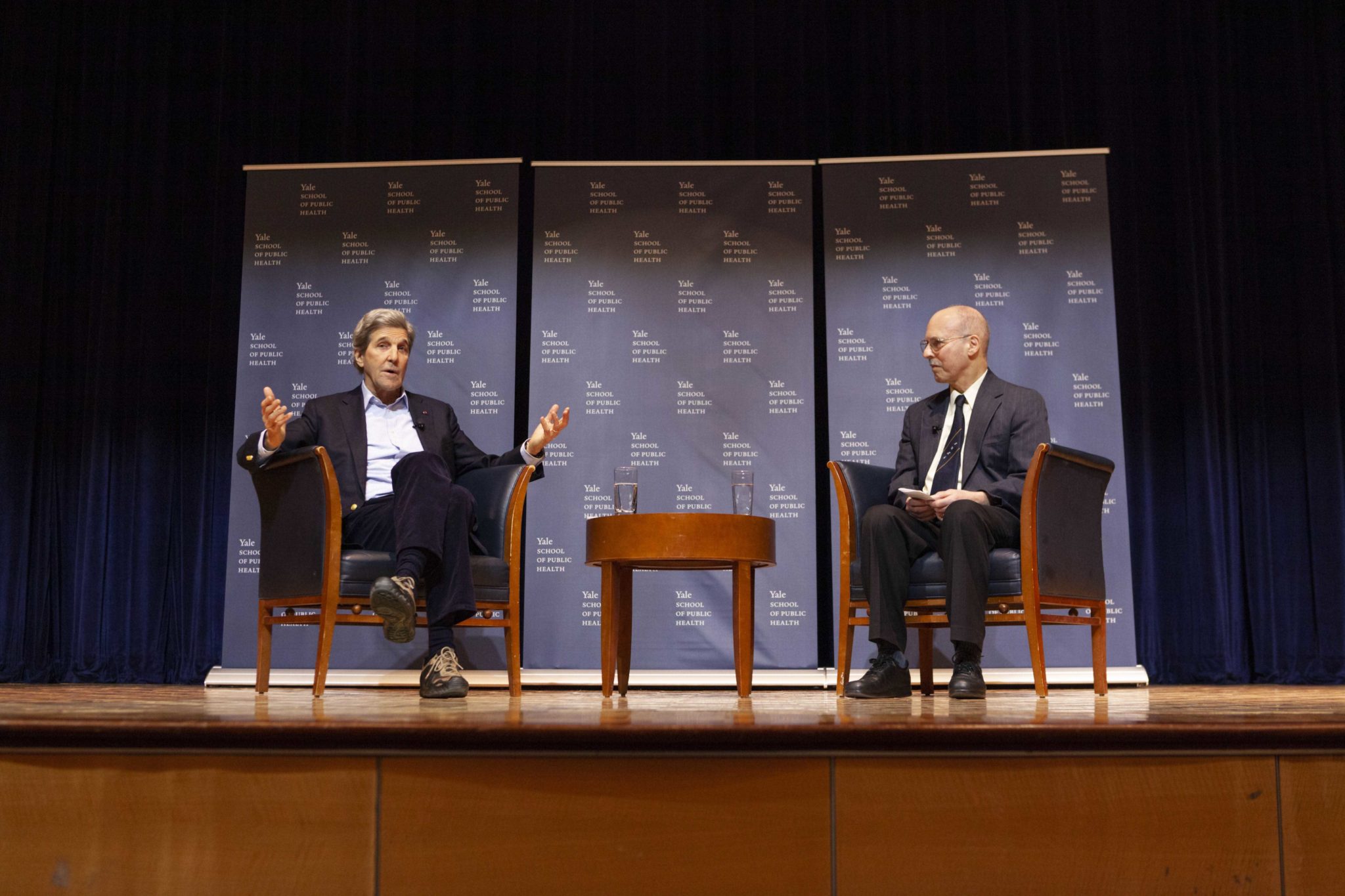
Courtesy of Harold Shapiro
On Friday afternoon, a few hundred students, faculty and guests filled the Yale School of Medicine’s Harkness Hall to hear former Secretary of State John Kerry speak about climate change policy and its relation to public health issues.
The event was co-sponsored by the Climate Change and Health Initiative at the Yale School of Public Health and the Yale Institute for Global Health. Moderated by Robert Dubrow, professor at the Yale School of Public Health and director of CCHI, the conversation began with introductions by Sten Vermund, dean of the Yale School of Public Health.
“Secretary Kerry is a champion of an aggressive U.S. and global approach to reducing greenhouse gas emissions. Given the existential threat of global warming, his highlighting of economic and health risks was timely, along with his suggested strategies for positive responses,” Vermund wrote in an email to the News.
After Vermund’s introductions, Dubrow first asked Kerry why he thought a conversation on climate change needed to take place at the Yale School of Public Health.
“This is enormously a matter of public health. It is simply not being met adequately despite all of our efforts in Paris,” Kerry said, referencing the Paris Agreement. “We are, by acts of omission and commission, living out a mutual suicide pact. No exaggeration. We only have one planet.”
In the Paris Agreement, 185 nations agreed to combat climate change and to actively invest in a sustainable, low-carbon future, according to the United Nations’ Climate Change website. Kerry mentioned his disapproval of President Donald Trump’s decision to exit the Paris Agreement several times during the conversation.
Although Kerry identified many negative impacts of climate change, he also shared his faith in current science and technology to mitigate the damage caused by rising global temperatures. According to Kerry, many green technologies exist but are not implemented. He added that the lag between inventing and implementing green technology is largely an issue of the political landscape.
“We need to make 2020 the year we vote out politicians who don’t endorse a green economy,” he said.
Dubrow then asked Kerry his opinion on actions that corporations and industries, including Yale, are taking to impact climate change. He first asked Kerry about divestment from the fossil fuel industry, an issue students have been pressing the University on for several years.
Kerry explained that although any manifestation of reduction in investments of that nature is valuable, he does not expect fossil fuel divestment to have a large impact on climate change.
“Do I think it’s a game changer or that it’s going to make the difference? No, not necessarily,” he said. “Someone else can buy that stock.”
After questions from Dubrow, audience members were invited to participate in the conversation. One attendee asked Kerry about his opinions on the Green New Deal, a set of economic stimulus programs proposed by U.S. Sen. Ed Markey, D-MA, and U.S. Representative Alexandria Ocasio-Cortez, D-NY, intended to address both climate change and inequality.
Kerry explained that he supports ingenuity and pushing the envelope, but sees the proposal as very ambitious.
“It’s reaching a little too fast too far, but there’s no harm. We should be encouraging people to put out new ideas,” he said.
In his closing remarks, Kerry outlined his current plans to create a day of world climate action. According to Kerry, he reserved the domain for the website “One Planet Action” just a few days ago and is hoping to create something akin to “Earth Day,” an annual celebration he helped to establish during the 1970s.
Attendee Harmanpreet Bhatti SPH ’19 wrote on Twitter, “‘We are not doing enough.’ Grateful that I had the opportunity to listen to former Secretary of State John Kerry discuss climate change policy. It served as a great reminder of the work to be done in this field.”
Kerry received his undergraduate degree from Yale College and currently serves as the Distinguished Fellow for Global Affairs at Yale.
Madison Mahoney | madison.mahoney@yale.edu







